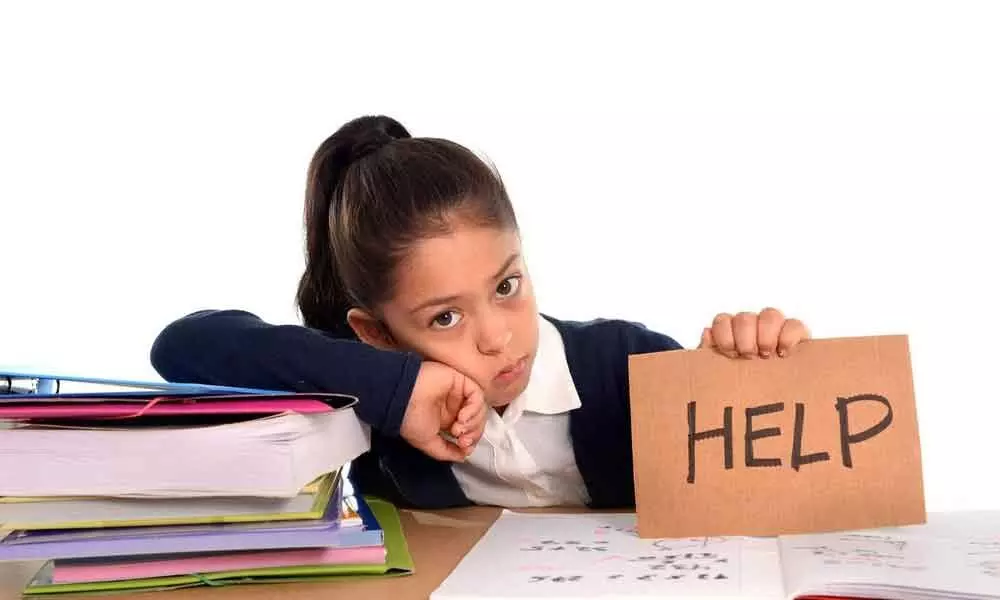Live
- Chanchalguda Jail Officials Say They Haven't Received Bail Papers Yet, Allu Arjun May Stay in Jail Tonight
- BJP leaders present evidence of illegal voters in Delhi, urge EC for swift action
- Exams will not be cancelled: BPSC chairman
- Nagesh Trophy: Karnataka, T.N win in Group A; Bihar, Rajasthan triumph in Group B
- YS Jagan condemns the arrest of Allu Arjun
- Economic and digital corridors to maritime connectivity, India and Italy building vision for future, says Italian Ambassador
- SMAT 2024: Patidar's heroics guide Madhya Pradesh to final after 13 years
- CCPA issues notices to 17 entities for violating direct selling rules
- Mamata expresses satisfaction over speedy conviction in minor girl rape-murder case
- Transparent Survey Process for Indiramma Housing Scheme Directed by District Collector
Just In

Help your kids cope with stress
In comparison to adults, children are prone to getting traumatized by troubling events easily, and this makes it important for parents to help their children when the times are tough.
In comparison to adults, children are prone to getting traumatized by troubling events easily, and this makes it important for parents to help their children when the times are tough. It could be a brutal accident, an unprecedented pandemic, a violent crime, or other disasters but with the right parental support, children have a higher chance of coming out stronger from an awful situation.
Anuja Kapur, Psychologist shares few tips wherein you can assist your child when tough times comes calling:
Every child responds differently to disturbing events: What children feel about a current disaster in their life and how they react to it can come and go in waves. Children can act moody and withdrawn at times, struck with sorrow and fear at other times. There's no absolute "right" or "wrong" way to feel after a traumatic event so make sure not to dictate what your child or how your child should feel and react to the event.
Encourage your child to be transparent: Just make sure you let your child know that whatever feelings they're experiencing is normal. The unpleasantness will pass if your child opens up about it and that the phase is temporary. While many teens may be reluctant to talk about their feelings with a parent, encourage them to confide in another trusted adult such as a family friend, relative, or a counselor and teacher. It's important to talkeeven if it's not with you.
Deter your child from reliving the disturbing event: Dwelling over, watching the footage, or imagining the event can be overwhelmingly stressful for children and this stress can even block their nervous system. However, to negate such things from happening encourage activities that keep your child's mind occupied so they're not obsessive about the event. You could encourage your children to read, play games together, or simply watch an uplifting movie.
Cocoon your child with warmth. In order to reassure your child that they are safe with you and feel secure, that the worst is over your physical affection is important in making them feel safe again. Teens may try to be tough through it and avoid being held, but they still need the proximity.
Maintain routines. Establishing a predictable structure and schedule for your child's life can help to make the world seem more stable again. Try to maintain regular times for meals, homework, and family activities. Make sure your child accommodates time and space for rest, play, and fun. Keeping up with a schedule can help countercheck the obnoxious feeling of stress and worry in children about the future being dark, hopeless, and unpredictable. Acknowledge and validate your child's concerns. The disastrous events in life may give place to unrelated fright and concerns in your child. However, understanding and accepting your child's present state is a comfort for the child. If at any point the child blames himself for the event make sure to make it clear and crisp the event was not their fault, you love them, and it's okay for them to feel upset, angry, or scared but not guilty.
Irrespective of the age of your child, it is vital for parents to offer that extra support and assistance following an unsettling event. The traumatic event may bring up unrelated fears and issues in your child. However, by accepting their thoughts and replacing their fear with your love and direction, the ominous feelings will start to fade away. Eventually, the child will be able to return to a normal and healthy life.

© 2024 Hyderabad Media House Limited/The Hans India. All rights reserved. Powered by hocalwire.com







